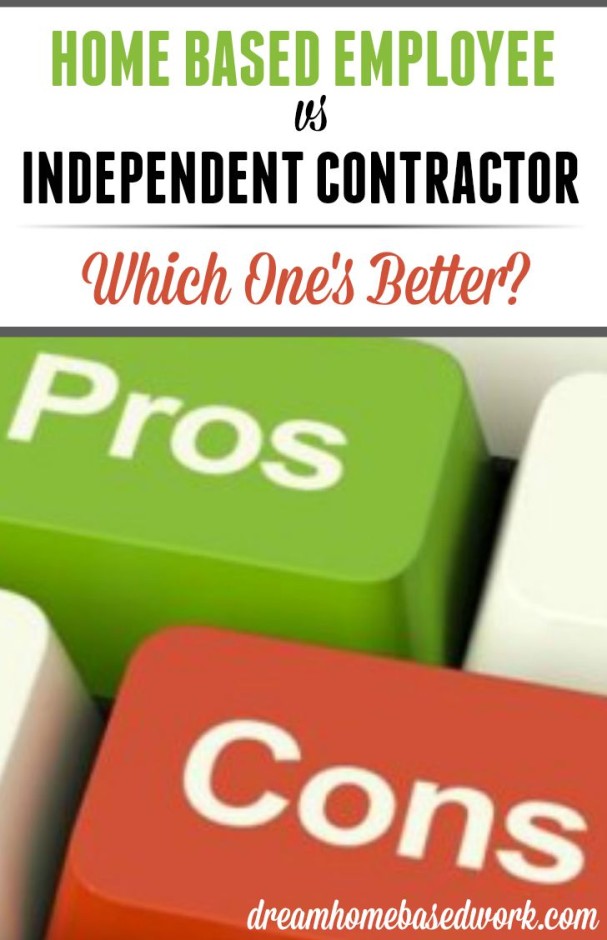 To be an employee or an independent contractor, that is the question! When trying to figure out which angle works best for you if you are to work from home, you will need to weigh the pros and cons of each one. However, before you can go there, you need to have a clear definition of what each term means.
To be an employee or an independent contractor, that is the question! When trying to figure out which angle works best for you if you are to work from home, you will need to weigh the pros and cons of each one. However, before you can go there, you need to have a clear definition of what each term means.
The EASIEST Ways To Earn Extra Cash Online...
- Branded Surveys - Get paid instantly by answering simple questions. Join now!
- Survey Junkie - Earn $20 fast for taking surveys & testing new products. Join now!
- PaidViewpoint - Take quick easy surveys! I've personally earned over $6,559 THIS YEAR! Pays fast via Paypal. Join Today!
- National Consumer Panel - Get paid to test free products! Join Now.
An employee is hired to work from home by a company. They are paid weekly or twice weekly for the services they render. The employer will give instructions on when you will be expected to work and how you will do your work. You may be able to earn a salary of a particular amount, or you may be paid by the hour. Minimum wage will apply if you are an employee and you will have tax deductions in your pay.
An independent contractor is not supervised as closely as an employee. They have the freedom to set their own work schedules and work may be received on a project by project basis. The payment method may be project-based, or hourly. The minimum wage law does not apply to an independent contractor and they are responsible for paying their own taxes.
[adsense468x15]
Individual Contractor: Pros and Cons
The pros include:
- A higher rate of compensation
- Taxes are not removed from your payments
- The freedom to do the work at your own time
- Your business expenses are tax-deductible
- You are more likely to get work from home opportunities
The cons include:
- Job security is low
- You pay for your own medical and social security taxes
- There are no employment benefits
- Payments are irregular
- Not protected by minimum wage law
- You incur the costs of running the business
- Pay your own taxes
- You are in charge of invoicing your client and collecting payment
- In the case of unemployment, there is no compensation
Employment: Pros and Cons
The pros include:
- Job security is higher
- Minimum wage applies
- Regular payments from the employer
- Medicare and social security taxes are shared with the employer who pays 50%
- There may be benefits offered such as: Medical, dental, vision, 401K, retirement, etc.
The cons include:
- The rate of compensation tends to be lower
- Business costs are paid by the employer
- Employer dictates when to work so the scheduling is less flexible
- Tax is deducted from your pay before it gets to the employee
- If you lose your job you may be eligible for unemployment compensation
- This is not likely to be a work at home opportunity
Companies That Hire Independent Contractors
- Smart Crowd, formerly Virtual Bee- (Read full review)
- Transcribe Me – (Read full review)
- Vicky Virtual – (Read full review)
- Time Etc. – (Read full review)
- Boldly
Companies That Hire Employees
- Alorica@Home – (Read full review)
- Concentrix, formerly Convergys – (Read full review)
- Extended Presence
- The Goodwin Agency, formerly Internet Girl Friday
- LiveOps – (Read full review)
- Sykes
- VIPDesk – (Read full review)
- Voicelog – (Read full review)
Final Thoughts on Independent Contractor vs. Employee
Now that you know the difference between each one, and the pros and cons that go with them, you will need to carefully weigh them and make your choice. It is also important for you to speak to each individual company that you are considering working with or for, and find out just how they work. There are some companies that may pay a higher amount of money to make up for the taxes you need to pay as an independent contractor.

